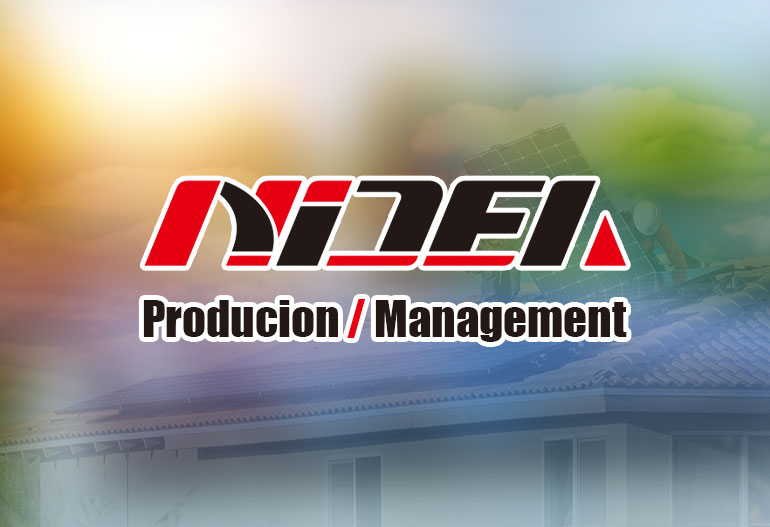Intelligent Temperature Control and Full-Sealed Design: NMS Series Photovoltaic Inverters Ensure Stable Operation in Extreme Environments
Intelligent Temperature Control and Full-Sealed Design: NMS Series Photovoltaic Inverters Ensure Stable Operation in Extreme Environments
In the global pursuit of sustainable energy, solar power has become a dominant force, and photovoltaic (PV) inverters are crucial to its success. However, extreme environments pose significant challenges to the operation of PV inverters, threatening their performance and lifespan. The NMS series of photovoltaic inverters, with its innovative intelligent temperature control and full-sealed design, emerges as a game-changer, enabling stable operation even in the harshest conditions.
The Harsh Realities of Extreme Environments for PV Inverters
Extreme environments, whether characterized by scorching heat, freezing cold, high humidity, or high dust and sand content, present formidable obstacles to the reliable operation of PV inverters. High temperatures can cause components to overheat, leading to reduced efficiency, increased power losses, and potential damage to sensitive electronic parts. In desert regions, where solar energy is abundant but temperatures can soar above 50°C (122°F), traditional inverters often struggle to maintain optimal performance. Excessive heat can accelerate the degradation of capacitors, semiconductors, and other components, shortening the overall lifespan of the inverter.
On the other hand, extremely low temperatures can also have detrimental effects. In frigid climates, such as polar regions or high-altitude mountainous areas, the viscosity of lubricants in mechanical components increases, reducing their mobility and potentially causing malfunctions. Batteries used in inverters may experience decreased capacity and longer charging times in cold conditions, affecting the overall power output and system performance. Additionally, condensation can form inside the inverter when the temperature fluctuates, leading to electrical short circuits and other failures.
High humidity environments, like tropical rainforests or coastal areas, expose inverters to the risk of corrosion. Moisture can penetrate the inverter's enclosure, causing metal parts to rust and electronic components to degrade. This corrosion can disrupt electrical connections, increase resistance, and ultimately lead to system failures. In areas with high levels of dust, sand, or salt particles, such as deserts or coastal industrial zones, these particles can enter the inverter and accumulate on components, obstructing heat dissipation and causing overheating. They can also scratch or damage sensitive surfaces, affecting the inverter's performance and reliability.
Intelligent Temperature Control: A Revolutionary Solution
The NMS series of photovoltaic inverters addresses the temperature-related challenges of extreme environments with its advanced intelligent temperature control system. This system is designed to maintain the inverter's internal temperature within an optimal range, regardless of the external environmental conditions.
Real-Time Temperature Monitoring
At the core of the intelligent temperature control system is a network of high-precision temperature sensors strategically placed throughout the inverter. These sensors continuously monitor the temperature of critical components, such as power electronics, semiconductors, and heat sinks, in real-time. The data collected by the sensors is transmitted to a central control unit, which analyzes the information and makes informed decisions about the appropriate cooling or heating actions.
Adaptive Cooling Strategies
Based on the temperature data, the NMS series inverter employs a variety of adaptive cooling strategies to dissipate excess heat. One of the key cooling methods is forced-air cooling, which uses high-performance fans to circulate air over the heat-generating components. The speed of the fans is automatically adjusted according to the temperature, ensuring efficient cooling while minimizing energy consumption. In addition to forced-air cooling, the NMS series may also incorporate liquid cooling systems in some models. Liquid cooling offers superior heat dissipation capabilities, especially for high-power inverters operating in extremely hot environments. It involves circulating a coolant, such as water or a specialized coolant fluid, through a network of pipes or channels in direct contact with the heat sources, effectively removing heat from the components.
Preemptive Heating in Cold Conditions
In cold environments, the intelligent temperature control system of the NMS series inverter takes proactive measures to prevent components from freezing or malfunctioning. It can activate internal heating elements, such as electric heaters, to warm up critical components before startup. This preemptive heating ensures that the inverter can operate smoothly even in sub-zero temperatures. The control system also monitors the temperature during operation and adjusts the heating output as needed to maintain the optimal operating temperature.
Thermal Management Optimization
The intelligent temperature control system of the NMS series inverter not only focuses on cooling and heating but also optimizes the overall thermal management of the device. It analyzes the thermal characteristics of different components and their interactions to identify potential hotspots and inefficiencies. By adjusting the layout of components, improving heat transfer pathways, and optimizing the airflow within the inverter enclosure, the system maximizes heat dissipation and minimizes temperature gradients. This comprehensive approach to thermal management ensures that all components operate within their recommended temperature ranges, enhancing the inverter's reliability and lifespan.
Full-Sealed Design: Protection Against the Elements
In addition to intelligent temperature control, the NMS series of photovoltaic inverters features a full-sealed design that provides robust protection against the harsh elements of extreme environments. This design ensures that the inverter is impervious to dust, sand, moisture, and other contaminants, safeguarding its internal components and enabling stable operation.
Hermetic Enclosure
The NMS series inverter is housed in a hermetically sealed enclosure made of high-quality materials, such as corrosion-resistant metals or durable plastics. The enclosure is designed to prevent the ingress of dust, sand, water, and other particles, effectively creating a barrier between the internal components and the external environment. Special seals and gaskets are used to ensure a tight fit at all joints and openings, further enhancing the enclosure's sealing performance. This hermetic design not only protects the components from physical damage but also prevents electrical failures caused by the accumulation of contaminants.
Ingress Protection (IP) Rating
The NMS series inverter boasts a high Ingress Protection (IP) rating, which indicates its level of protection against the intrusion of solid objects and liquids. The IP rating is expressed as a two-digit code, with the first digit representing protection against solid objects and the second digit representing protection against liquids. For example, an IP68 rating means that the inverter is completely dust-tight and can be submerged in water at a specified depth for a certain period without water ingress. The high IP rating of the NMS series ensures that it can withstand the harsh conditions of extreme environments, such as dusty deserts or rainy coastal areas, without compromising its performance or reliability.
Resistance to Corrosion and Chemicals
In environments with high humidity or exposure to corrosive substances, such as saltwater in coastal regions or chemical fumes in industrial areas, the full-sealed design of the NMS series inverter provides excellent resistance to corrosion. The materials used in the enclosure and internal components are carefully selected for their corrosion-resistant properties. For example, stainless steel or aluminum alloys are commonly used for the enclosure, while coated or sealed electronic components are employed to prevent chemical reactions with the surrounding environment. This resistance to corrosion ensures that the inverter can maintain its integrity and functionality over an extended period, even in the most challenging conditions.
Real-World Applications and Success Stories
The effectiveness of the intelligent temperature control and full-sealed design of the NMS series photovoltaic inverters has been demonstrated in numerous real-world applications across a wide range of extreme environments.
Desert Solar Power Plants
In the vast deserts of the Middle East and North Africa, where solar energy resources are abundant but temperatures can be extremely high, the NMS series inverters have been successfully deployed in large-scale solar power plants. The intelligent temperature control system of the inverters ensures that they can operate efficiently even in the scorching heat, maintaining a stable internal temperature and preventing overheating. The full-sealed design protects the inverters from the fine sand and dust that are prevalent in desert environments, preventing component damage and ensuring long-term reliability. As a result, these solar power plants have been able to achieve high energy yields and consistent performance, contributing significantly to the region's renewable energy goals.
Arctic Solar Power Systems
In the cold and harsh Arctic regions, where temperatures can drop well below -30°C (-22°F), the NMS series inverters have proven their ability to operate reliably. The preemptive heating function of the intelligent temperature control system warms up the components before startup, allowing the inverters to start smoothly even in extremely cold conditions. The full-sealed design prevents moisture and snow from entering the inverters, protecting the internal components from freezing and electrical failures. These features have made the NMS series inverters an ideal choice for off-grid solar power systems in the Arctic, providing a sustainable and reliable source of electricity for remote communities and research stations.
Coastal Solar Installations
In coastal areas, where high humidity and salt spray can pose significant challenges to the operation of PV inverters, the NMS series has demonstrated its resilience. The full-sealed design of the inverters prevents saltwater and moisture from entering the enclosure, protecting the components from corrosion. The intelligent temperature control system ensures that the inverters can handle the temperature fluctuations that are common in coastal environments, maintaining optimal performance. As a result, coastal solar installations equipped with NMS series inverters have been able to operate continuously without significant disruptions, contributing to the local energy supply and reducing the reliance on fossil fuels.
The Competitive Edge and Industry Impact
The intelligent temperature control and full-sealed design of the NMS series photovoltaic inverters give it a significant competitive edge in the market. These innovative features not only enable the inverters to operate reliably in extreme environments but also offer several other benefits that appeal to customers.
Extended Lifespan
By protecting the internal components from the damaging effects of extreme temperatures, dust, moisture, and other contaminants, the NMS series inverters have an extended lifespan compared to traditional inverters. This means that customers can enjoy longer periods of trouble-free operation and reduced maintenance costs over the lifetime of the solar power system.
Higher Energy Yield
The ability to maintain stable operation in extreme environments ensures that the NMS series inverters can maximize the energy yield of solar power systems. In harsh conditions where traditional inverters may experience performance degradation or even failures, the NMS series continues to operate efficiently, extracting the maximum amount of power from the PV panels. This higher energy yield translates into greater savings for customers and a faster return on investment.
Versatility
The NMS series inverters' suitability for a wide range of extreme environments makes them a versatile choice for solar power projects around the world. Whether it's a desert solar farm, an Arctic off-grid system, or a coastal solar installation, the NMS series can meet the specific requirements of each application, providing a reliable and efficient solution.
These advantages have had a significant impact on the solar energy industry, driving the adoption of the NMS series inverters in challenging environments and setting a new standard for inverter design and performance. As the demand for renewable energy continues to grow, the NMS series is expected to play an even more crucial role in enabling the widespread deployment of solar power in extreme environments, contributing to a more sustainable energy future.
In conclusion, the intelligent temperature control and full-sealed design of the NMS series photovoltaic inverters represent a significant advancement in inverter technology. These innovative features address the challenges of extreme environments, ensuring stable operation, extended lifespan, and higher energy yield. With its proven track record in real-world applications and its competitive edge in the market, the NMS series is poised to lead the way in enabling the reliable and efficient operation of solar power systems in the harshest conditions, making solar energy a more accessible and sustainable energy source for all.

